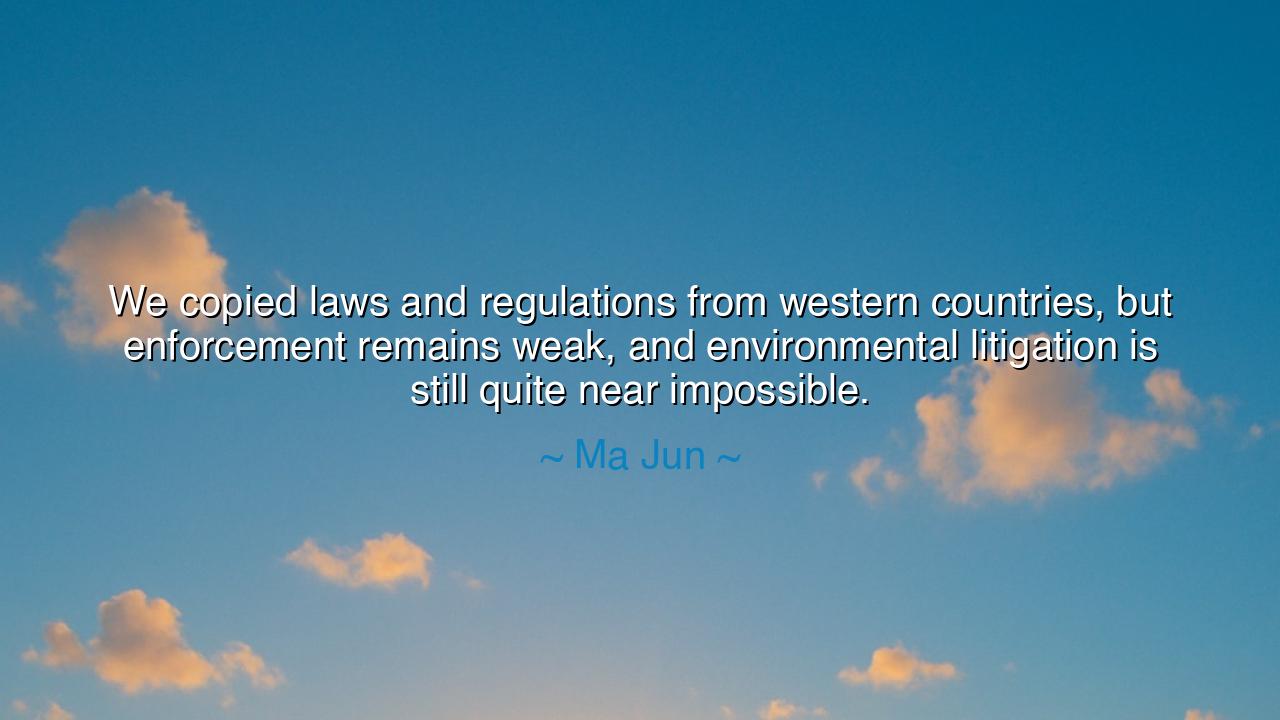
We copied laws and regulations from western countries, but
We copied laws and regulations from western countries, but enforcement remains weak, and environmental litigation is still quite near impossible.






In a voice burdened by truth and tempered by hope, Ma Jun once declared, “We copied laws and regulations from western countries, but enforcement remains weak, and environmental litigation is still quite near impossible.” His words are neither of despair nor accusation—they are the lament of a man who has seen wisdom written but not lived, justice proclaimed but not practiced. For what good are laws and regulations when they lie dormant, like swords hung upon the wall, polished yet never drawn? In his voice, we hear the ancient struggle between word and deed, between knowledge and courage. He speaks not only of China, but of all nations that mistake imitation for integrity, and paper virtue for living justice.
The origin of the quote lies in Ma Jun’s lifelong mission to defend the earth from silent ruin. As an environmentalist and researcher, he uncovered the pollution that stained the rivers and poisoned the air of his homeland. Yet, though the government had copied Western laws—echoing the words of democracy, justice, and environmental protection—the spirit of those laws was not yet alive. The ink was imported, but the will was not. His statement reveals the eternal truth that law without enforcement is but a promise without breath, and promises that are not kept turn quickly into decay.
In ancient times, the philosopher Confucius warned of such emptiness when he said, “Fine words and an insinuating appearance are seldom associated with true virtue.” To write good laws is easy; to enforce them with fairness requires virtue, courage, and discipline. A just society cannot merely borrow the symbols of righteousness—it must embody them. A nation may build courts, create ministries, and hold councils, but if the hearts of its rulers and citizens lack integrity, justice will wither like a tree without roots. Ma Jun reminds us that no empire, however vast or modern, can flourish if it neglects the soul of governance: accountability.
The tale of Emperor Ashoka of India shines as a counterpoint through history. Once a conqueror drenched in blood, he turned his empire toward the path of compassion after seeing the suffering his wars caused. Ashoka did not merely carve new laws upon stone pillars; he enforced them with the force of conscience, building hospitals, protecting forests, and sending envoys of peace. His greatness did not come from copying others, but from aligning his governance with moral conviction. So too must modern leaders understand that to guard the environment is not an imitation of Western ideals—it is the timeless duty of all who inherit the earth.
Ma Jun’s words also speak to the weakness of environmental litigation, the fragile thread by which the people may hold power to account. He sees a world where pollution chokes the rivers, yet the victims are denied a voice; where corporations poison the soil, yet justice hides behind bureaucracy. This is not the failure of law, but of spirit. True justice must be accessible, or it is no justice at all. The right to breathe clean air, to drink pure water, to live in balance with nature—these are not privileges granted by rulers; they are the birthright of humanity itself. When such rights are trampled and no court will listen, civilization stands upon the edge of hypocrisy.
Yet Ma Jun’s message is not one of condemnation—it is a call to awakening. He does not ask his people to abandon progress, but to infuse progress with integrity. To copy is not shameful, but to copy without comprehension is folly. The wisdom of the West can be a seed, but it must be planted in native soil, tended by the hands of those who believe in its purpose. The enforcement of law is not the work of officials alone—it belongs to every citizen who dares to speak, to question, to act. The rivers will not defend themselves; the forests cannot plead their case. It is the duty of humankind to become their voice.
Therefore, let this truth be engraved in the hearts of those who build nations: the worth of a law lies not in its elegance, but in its execution. To borrow words without embodying their meaning is to build a temple with hollow stone. Let each man and woman, whether ruler or worker, scholar or farmer, remember that stewardship of the earth is not a matter of imitation, but of conviction. The strength of a civilization is measured not by the number of its statutes, but by the justice with which they are upheld.
And so, Ma Jun’s words echo like a bell through the ages: if we would save the earth, we must first awaken the conscience. Write laws, yes—but breathe life into them. Speak of justice—but let it walk among the people. For only when law, morality, and courage become one can humanity truly claim to be civilized. Then, and only then, will the rivers run clear again, and the air carry not the smoke of corruption, but the breath of renewal.






AAdministratorAdministrator
Welcome, honored guests. Please leave a comment, we will respond soon